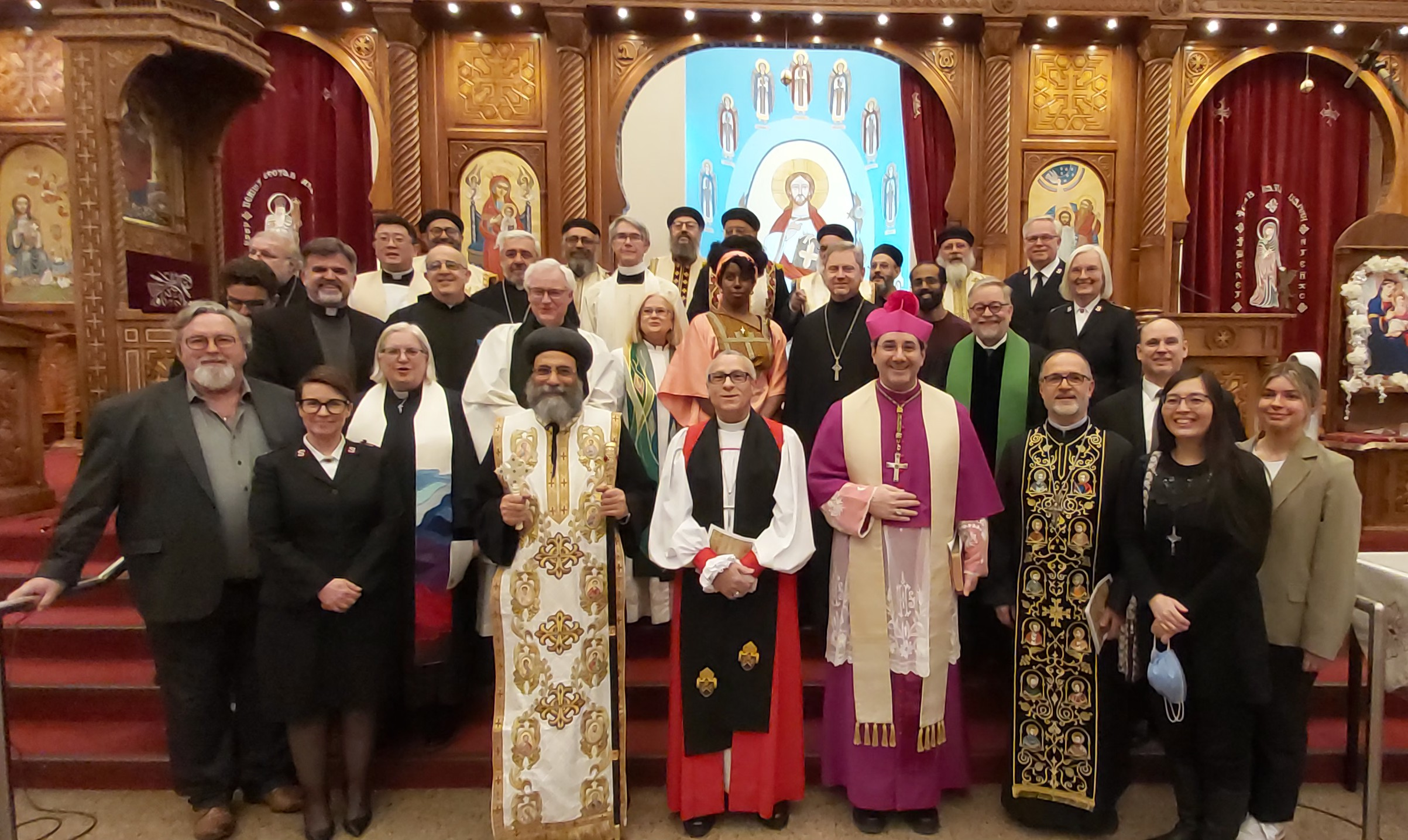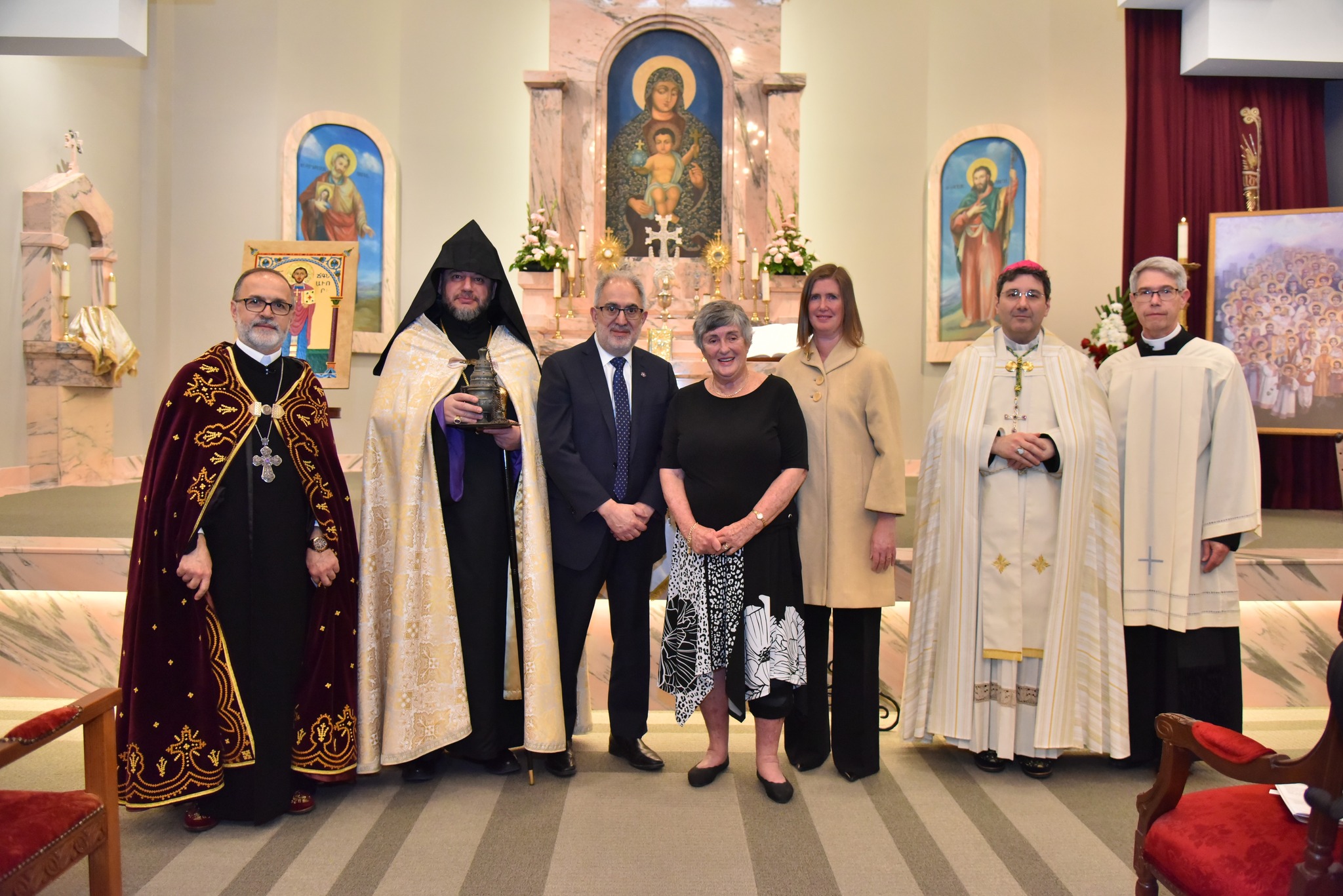- Home
- Our Community
-
Offices & Ministries
- Administrative Offices (A-N)
-
Administrative Offices (O-Z)
- Planning, Properties & Housing
- Public Relations & Communications
- Research
-
Spiritual Affairs
- Home
- Churches and Ecclesial Communities with valid Baptism
- Registration Forms for Baptism, First Holy Communion, Confirmation, and RCIA
- Marriage Preparation
- Celebration of Holy Mass Outside of a Sacred Space Protocol
- Exorcism Protocol
- Healing Service Protocol
- Visiting Clergy-Laity Protocol
- Selected Pastoral Notes on Sacraments and Sacramentals
- Faculties for Clergy
- Temporal Affairs
- Western Bishops Office
- Volunteer Screening
- Pastoral Ministries
- Outreach in Justice & Love
- Our Faith
- Outreach
- Contact Us
- Search

Office for Ecumenical and Interfaith Relations
Mandate
The Office for Ecumenical and Interfaith Relations has a dual mandate in the Archdiocese of Toronto:
- To promote the restoration of full visible unity among Christians, Churches and ecclesial communities.
- To foster good relations, mutual understanding, and friendship between Catholic and non-Christian communities.

Ecumenical Relations: Promoting Christian Unity
Vision
The desire and vision of Jesus Christ "that they may all be one" (John 17:21), received in the teaching of the Catholic Church at Vatican II and post-conciliar magisterial documents, underlies and shapes the promotion of full visible unity among Christians, Churches and ecclesial communities in the Archdiocese of Toronto.
“The Catholic Church solemnly pledged itself to work for Christian unity at the Second Vatican Council. The Decree Unitatis Redintegratio explains how the unity that Christ wishes for his Church is brought about ‘through the faithful preaching of the Gospel by the Apostles and their successors—the Bishops with Peter's successor at their head—through their administering the sacraments, and through their governing in love’, and defines this unity as consisting of the ‘confession of one faith…the common celebration of divine worship…the fraternal harmony of the family of God’. This unity which of its very nature requires full visible communion of all Christians is the ultimate goal of the ecumenical movement. The Council affirms that this unity by no means requires the sacrifice of the rich diversity of spirituality, discipline, liturgical rites and elaborations of revealed truth that has grown up among Christians in the measure that this diversity remains faithful to the apostolic Tradition.”1
On the day after the Mass for the Inauguration of his Petrine Ministry, Pope Leo XIV reaffirmed this commitment to promoting Christian unity:
"While we are on the journey to re-establishing full communion among all Christians, we recognize that this unity can only be unity in faith. Bishop of Rome, I consider one of my priorities to be that of seeking the re-establishment of full and visible communion among all those who profess the same faith in God the Father, the Son, and the Holy Spirit.
Indeed, unity has always been a constant concern of mine, as witnessed by the motto I chose for my episcopal ministry: In Illo uno unum, an expression of Saint Augustine of Hippo that reminds us how we too, although we are many, "in the One -- That is Christ -- we are one" (Enarr. in ps., 127, 3).
What is more, our communion is realised to the extent that we meet in the Lord Jesus. The more faithful and obedient we are to him, the more united we are among ourselves. We Christians, then, are called to pray and work together to reach this goal, step by step, which is and remains the work of the Holy Spirit.
Aware, moreover, that synodality and ecumenism are closely linked, I would like to assure you of my intention to continue Pope Francis' commitment to promoting the synodal nature of the Catholic Church and developing new and concrete forms for an ever stronger synodality in ecumenical relations."2
Video: Pope Francis and Christian Unity
Mission
The Office fulfills the mandate of the promotion of Christian unity by providing opportunities and resources for the formation of Catholics in the Archdiocese of Toronto as well as events that foster encounters and cooperation with other Christians, Churches, and ecclesial communities.
Among the activities that promote the restoration of full visible unity, priority is given to the Week of Prayer for Christian Unity and spiritual ecumenism, education and formation, dialogue as well as common witness for peace, justice, and the integrity of creation.
Interfaith Relations
Vision
The Catholic Church’s vision of relationship with other religions is grounded in a biblical tradition that is received in Vatican II’s Declaration Nostra aetate and post-conciliar magisterial documents.
The Church is committed to "promote unity and love among all people, indeed among nations and considers above all what we have in common, drawing everyone into fellowship."3
"The Catholic Church rejects nothing that is true and holy in these religions. She regards with sincere reverence those ways of conduct and of life, those precepts and teachings which, though differing in many aspects from the ones she holds and sets forth, nonetheless often reflect a ray of that Truth which enlightens all men. Indeed, she proclaims, and ever must proclaim Christ 'the way, the truth, and the life' (John 14:6), in whom men may find the fullness of religious life, in whom God has reconciled all things to Himself. It therefore, exhorts her members, that through dialogue and collaboration with the followers of other religions, carried out with prudence and love and in witness to the Christian faith and life, they recognize, preserve and promote the good things, spiritual and moral, as well as the socio-cultural values found among them."4
On the day after the Mass for the Inauguration of his Petrine Ministry, Pope Leo XIV drawing on the legacy of his predecessors addressed leaders of the non-Christian religious traditions with a desire for a "common path" that can and must be understood to involve everyone "in a spirit of human fraternity" whereby avenues of encounter effectively promote "the culture of dialogue" in which "mutual collaboration as the code of conduct; reciprocal understanding become the method and standard."5
Video: Pope Leo XIV and Interreligious Dialogue
Mission
The Office fulfills the mandate of the promotion of interfaith relations by providing opportunities and resources for the formation of Catholics in the Archdiocese of Toronto, as well as events that foster encounters and cooperation with other religious traditions.
Nostra aetate’s paragraph 5 provides concrete direction for outreach:
"We cannot truly call God, the Father of all, if we refuse to treat in a brotherly way any man, created as he is in the image of God. Man's relation to God the Father and his relation to men his brothers are so linked together that Scripture says: 'He who does not love does not know God' (1 John 4:8). No foundation therefore remains for any theory or practice that leads to discrimination between man and man or people and people, so far as their human dignity and the rights flowing from it are concerned. The Church reproves, as foreign on the mind of Christ, any discrimination against men or harassment of them because of their race, color, condition of life, or religion. On the contrary, following in the footsteps of the holy Apostles Peter and Paul, this sacred synod ardently implores the Christian faithful to 'maintain good fellowship among the nations' (1 Peter 2:12), and, if possible, to live for their part in peace with all men, so that they may truly be sons of the Father who is in heaven.”
Interfaith dialogue has come to be expressed in four interdependent constitutive forms without any compromise to the call to evangelical proclamation:
"The dialogue of life, where people strive to live in an open and neighbourly spirit, sharing their joys and sorrows, their human problems and preoccupations.
The dialogue of action, in which Christians and others collaborate for the integral development and liberation of people.
The dialogue of theological exchange, where specialists seek to deepen their understanding of their respective religious heritages, and appreciate each other's spiritual values.
The dialogue of religious experience, where persons, rooted in their own religious traditions, share their spiritual riches, for instance with regard to prayer and contemplation, faith and ways of searching for God in the Absolute."6
Founding Principles and History

A Commission was mandated with the task of fostering Christian unity and promoting ecumenical and interfaith dialogue in the Archdiocese of Toronto as early as January of 1963. On 30 September 1987 Gerald Emmett Cardinal Carter established The Ecumenical Affairs Office in the Archdiocese of Toronto. Cardinal Carter said that it was the responsibility of the local church, following the teachings of the Second Vatican Council, “to implement worldwide ecumenical directives, but also to take the initiative, within the unity of faith, to enrich this movement by our own forms of ecumenical action in prayer, education, the media, social work and theological exchange.” Thomas Cardinal Collins responding to the evolving religious landscape in the Archdiocese and established two departments on 27 August 2020, each with its own specific responsibilities: the Office for Promoting Christian Unity and Religious Relations with Judaism, and, the Office for Interreligious Dialogue.
On 25 June 2025, Frank Cardinal Leo brought together the Archdiocese of Toronto's commitment to visible unity among Christians, relationship with the Jewish community, and interreligious dialogue under the Office for Ecumenical and Interfaith Relations with a full-time director.
The terms "ecumenical" and "interfaith" are often popularly used interchangeably. However, in Catholicism, they are distinct. “It is important not to lose sight of the essential difference between dialogue with different religious traditions which aims at establishing good relations and co-operation, and dialogue with other Christian communities which aims at restoring the unity Christ willed for his Church and is properly called ecumenical.”7
Ecumenism is “not premised on compromise as if unity should be achieved at the expense of truth. On the contrary, the search for Christian unity leads us into a fuller appreciation of Gods revealed truth. The bedrock of ecumenical formation, therefore, is that ‘The Catholic faith must be explained more profoundly and precisely, in such a way and in such terms as our separated brothers can also really understand (UR §11).'”8
The promotion of Christian unity involves a necessary appreciation of the faith of the Church received through the ages and demands the formation of an ecumenical spirit that is grounded in prayer and discernment and is disposed to a method for dialogue and engagement in love, truth, and life.
Religious relations with Judaism hold a unique status in the structure of the Holy See:
“For Catholics, directives about relationships with the Jewish people are guided by the Commission for Religious Relations with the Jews. Relations with the members of other religions are guided by the Pontifical Council for Inter-Religious Dialogue. In working out religious relationships with Jews and in their relations with members of other religions, in accordance with appropriate directives, Catholics can find many opportunities for collaboration with members of other Churches and ecclesial Communities.”9
Engagement in interfaith activities requires a solid formation in knowledge of one's own faith and "an attitude of respect for the other person, from the conviction that the other person has something good to say. It assumes that there is room in the heart for the person's point of view, opinion, and proposal. To dialogue entails a cordial reception, not a prior condemnation. In order to dialogue, it is necessary to know how to lower the defences, open the doors of the house, and offer human warmth."10
Structure
The Office for Ecumenical and Interfaith Relations has a Director who coordinates and promotes its dual mandate. When projects and questions are raised by the Archbishop of Toronto, a Commission is established to assist the Director in fulfilling the mandate of the Office.11
The Office represents the Archdiocese of Toronto at various ecumenical and interfaith events; locally, nationally and internationally.
Endnotes
- Directory for the Application of Principles and Norms on Ecumenism, Pontifical Council for Promoting Christian Unity, Vatican: 25 March 1993, §20. [Hereafter Ecumenical Directory].
- Pope Leo XIV, 'Address of the Holy Father to Representative of other Churches and Ecclesial Communities and other Religions,' 19 May 2025.
- Nostra aetate, Declaration on the Relations of the Church to Non-Christian Religions, Second Vatican Council, 28 October 1965, §1 [Hereafter NA].
- NA §2.
- Pope Leo XIV, 'Address of the Holy Father to Representative of other Churches and Ecclesial Communities, and other Religions," 18 May 2025.
- Dialogue and Proclomation: Reflection and Orientations on Interreligious and Dialogue and proclomation of the Gospel of Jesus Christ, pontifical Council for Interreligious Dialogue, Vatican: 19 May 1991, §42.
- The Bishop and Christian Unity: An Ecumenical Vademecum. Pontifical Council for Promoting Christian Unity, Vatican, 5 June 2020, §40 [Hereafter Vademecum].
- Vademecum §16.
- Ecumenical Directory §210.
- On Heaven and Earth: On Family, and the Church in the Twenty-First Century, Pope Francis (Jorge Mario Bergolio), 19 April 2023.
- Ecumenical Directory §42, §44.
*Source for the image at the top of the webpage: Wikimedia Commons
Archdiocese of Toronto-Catholic Pastoral Centre
1155 Yonge St.
Toronto, ON
M4T 1W2
t1: 416-934-0606
t2: 416-934-3400
e: ecumenicalandinterfaith@archtoronto.org
Get Directions
Rev. Dr. L. M. Melo
Director
t: 416-934-0606 x: 343
Rema Celio
Program and Event Coordinator
e: rcelio@archtoronto.org
t: 416-934-3400 x: 527

